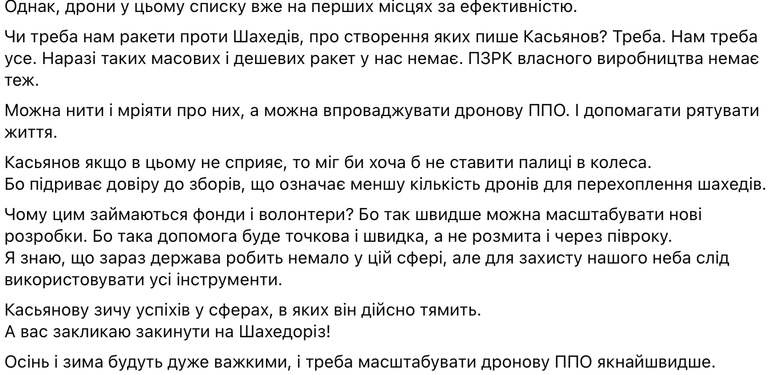Interceptor drones supplied to Ukraine’s Armed Forces have already downed 444 Russian Shaheds and Gerberas – Sternenko
Drone Industry

Ukrainian interceptor drones proved effective in repelling a swarm of Russian Shaheds. The country needs to scale drone-based air defense as quickly as possible.
This was reported on Facebook by blogger and volunteer Serhiy Sternenko, Censor.NET writes.
"Lately I’ve seen many comments under fundraisers claiming interceptor drones are ineffective, that ‘experts’ say we need missiles against drones. It turned out this stems from Yurii Kasianov’s daily statements that interceptors allegedly don’t shoot down Shaheds. That’s utter nonsense. The drones we supply already account for 444 downed Shaheds and Gerberas," he noted.
At the same time, Sternenko confirmed that state-procured, as opposed to foundation-supplied, drones are not always effective, although at least one model is delivering strong results.
"The success rate of the systems we deliver (most often the Wild Hornets’ Sting) is 70%, and sometimes higher. We’ve had cases of 20 launches and 17 shoot-downs. The cost is ₴90,000 per drone and it can be recovered if there was no strike," the volunteer explained.
He also called it "a complete falsehood" that interceptor drones cannot catch Shaheds, let alone jet-powered ones.
"There are plenty of cases where you actually have to turn the interceptor around because it outruns the Shahed. Jet-powered Shaheds are harder, but there are drones capable of catching them.
Can interceptors alone close the sky? Of course not. They’re one tool in a layered system, alongside SAMs, MANPADS, helicopter and light aviation, electronic warfare, anti-aircraft guns, and more. Still, drones now rank among the most effective in that list," Sternenko stressed.
At the same time, he agreed that Ukraine needs missiles against Russian Shaheds.
"At present, we don’t have mass, low-cost missiles. We don’t have domestically produced MANPADS either. We can complain and daydream about them, or we can deploy drone air defense, and help save lives... Autumn and winter will be very tough, and we need to scale drone air defense as fast as possible," Sternenko concluded.


